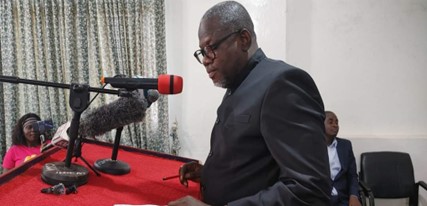The recent extradition of Guinean mercenary Ibriam Kahli Cheriff has ignited significant controversy in Liberia, prompting the government to defend its actions as consistent with international law. Jerolinmek Matthew Piah, the Minister of Information, Cultural Affairs, and Tourism, addressed the media to clarify that the decision was taken to uphold regional security and to honor Liberia’s obligations under international treaties. He described Cheriff’s alleged involvement in destabilization activities in Guinea as a serious threat that warranted immediate action on Liberia’s part. By extraditing him, Piah argued, the government was committed to maintaining peace in a region that has previously suffered from instability and unrest.
Piah emphasized the necessity of careful handling of national security issues, warning that mismanagement could lead to long-lasting negative ramifications for Liberia. He conveyed that the government’s priority is to ensure the safety and security of its citizens, indicating that every decision made with regard to Cheriff’s extradition was made with an acute awareness of potential security implications. The Minister signaled that due diligence had been applied to ensure the extradition respected both Liberian laws and the rights of the accused, while underscoring that the process prioritized Liberia’s broader national interests.
Nevertheless, the circumstances surrounding the extradition have drawn scrutiny following a habeas corpus petition filed by Cheriff’s legal representatives, which led Criminal Court ‘A’ Judge Roosevelt Willie to issue a 72-hour ultimatum for the government to produce him. The judge’s order has heightened concerns about the transparency and legality of Cheriff’s custody and subsequent extradition. There are accusations from legal representatives that Cheriff may have been unlawfully removed from legal protections, and these claims have worsened the controversy surrounding the government’s handling of the situation.
Former Associate Justice Cllr. Kabineh M. Ja’neh, representing Cheriff, accused key government officials, including Justice Minister Oswald N. Tweh, of effectively kidnapping his client, thus alleging serious violations of legal protocols. As kidnapping under Liberian law carries severe penalties, such accusations have prompted public alarm and calls for accountability regarding Cheriff’s alleged mistreatment. While Minister Piah took a firm stance in defending the government’s actions, insisting that they were carried out with the country’s interests in mind, the accusations of misconduct and claims of violation of rights have cast a shadow over the legitimacy of the government’s actions.
Piah further defended the extradition in an interview, asserting that safeguarding Liberia’s stability hinged on the ability to cooperate with neighboring countries regarding mutual security threats. He presented a hypothetical scenario to illustrate the reciprocity of such actions, suggesting that if a Liberian citizen were suspected of endangering Guinea’s security, Liberia would expect that individual to be returned. This emphasis on cooperation reflects Liberia’s strategy to foster strong regional relations as a means to preclude conflict, resonating with a broader historic context of civil unrest that Liberians would prefer not to revisit.
In conclusion, while the government maintains that its decision to extradite Cheriff was necessary to uphold national and regional security, the accompanying legal allegations and criticisms surrounding the handling of his case continue to provoke public concern about the integrity and transparency of government actions. Piah’s framing of the situation highlights the delicate balance between addressing national security threats and ensuring the protection of individual rights within the legal framework. As the international community closely watches Liberia’s approach to such complex issues, the need for accountability and transparency remains crucial in navigating the interplay between law, governance, and security in a post-conflict society.














